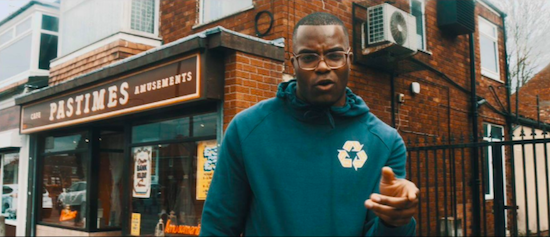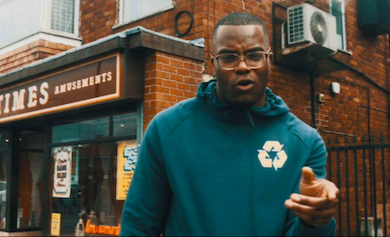Chiedu Oraka in a still from his ‘N.H.E.’ video
“My love for the north is permanent like a marker,” raps Chiedu Oraka on his single ‘N.H.E (North Hull Estate)’ over a woozy, propulsive beat. Hull is the UK’s Capital of Culture this year, and has thrived under the spotlight, but Oraka’s music video for the track shows another side of the city; rolling images capture pubs, off-licences, parks, shops and the concrete streets of the estates where he grew up, a place that, he says, “had no culture”.
When he speaks to tQ, Oraka suggests that times are changing. He’s become one of Hull’s greatest advocates and uses his music as a platform to explore its spirit and uniqueness, while not shying away from its problems. “My sound is working class northern England,” he says. “It’s DIY, it’s unique and it’s about the systematic feeling of not being included – we feel like we’re rebelling against the system.”
Oraka is part of the Hull Substance Future Forum happening this Thursday, December 7, along with tQ’s Patrick Clarke, the PRS Foundation’s Vanessa Reed, the Hebden Bridge Trade Club’s, Mal Campbell and Heavenly Records’ Katherine Cantwell. The panel will discuss living and working in the music industry outside London, and whether London can still claim to be the best place for artists and musicians. The Quietus spoke to some of the panellists, plus a few other people from various strands of the industry, about the benefits of leaving (or never moving to) the capital.
“I moved back here from London around four years ago and haven’t looked back,” says Michael Kasparis, who runs Night School Records in Glasgow and performs as Apostille. “The scene feels quite homogenous and interconnected but also unique because nothing seems to ossify here, it’s always moving. Plus, it’s cheaper to live, so being a musician or a label owner is easier. You don’t have to work a 60-hour job on minimum wage to afford to put a record out every three months, which was the reality of my time down south. When I lived in London I released maybe two artists from there in three years. Since moving back to Glasgow I’ve released about eight artists that live within a four-mile radius of my house.”
Money is clearly a major incentive to leave London, especially for younger people who have only known the spike in living costs in the capital and have never had the opportunity to save or invest. “As much as I would like to say money doesn’t come into it, it does,” Katherine Cantwell says. She has moved to Liverpool and now works remotely in her role at Heavenly. “It’s less of a bunfight to rent a room or flat. I’ve been to over 10 viewings a day in London to rent a small room in properties with no lounge. Here, I live with one other person in a two-bed, it has a lounge, balcony and shared garden – it’s half the price of anywhere I rented during my six years in London.”
And of course alleviating money worries also frees up mental and physical energy. “I have more headspace to read, write and think,” Cantwell says. “For me, so much of London was spent getting from a to b, worrying about money, being pressured to go to next best bar or food place. I lost some of my creative thinking time.”
Liv Willars, who now lives in Sheffield after leaving London and runs One Beat PR, echoes this: “I’m now more proficient at my job – instead of always rushing around and wasting hours each day travelling, I have time to really focus on each artist and release that I work on, and to spend more time coming up with ideas for campaigns and chatting to writers. Being free from extortionate rent has also meant that I’ve been able to afford to take on another publicist, which has eased my workload and allowed me to finally take holidays.”
Willars admits that her initial London-based internships were valuable in gaining experience and making contacts, but even that world has changed so much now that she feels the path she took may not be an option today. “I don’t think I could have had the same start in music now as I did all those years ago. I relied on housing benefits for help when I was doing internships, but now that system’s changed and rent is so much more expensive. It must be impossible for those who don’t have family or friends they can stay with in London, or financial help, to break into the industry.”
“Things are changing,” Mal Campbell of the Trades Club in Hebden Bridge tells me. “You have what people might call a B-list town and all it requires is for an enterprising few people to get together and you have a good little scene going.” Despite being in a town with a population of 5,000, the Trades has become a destination venue for numerous international touring artists, frequently drawing people from across the UK – including Cantwell’s Heavenly records, who decided to throw their weekend-long 25th birthday bash their rather than in London.
Of course, to paint these cities and towns as untouched golden utopias, free from the suffocating gentrification that haunts London, would be false and naive. Similarly, to suggest there aren’t engaged, passionate musical communities doing good things in London would be wrong. People are aware of the drawbacks of being away from the capital, and it mainly comes in the form of lack of industry support. Kasparis says: “Because many of the powerful institutions are based in London, you don’t get a fair crack at developing the networks that help labels and artists because you don’t drink in the same pubs, go to the same gigs as whichever influential person or do drugs with yadda yadda.”
Although given the direction of the capital and some people’s increasing shift to avoiding or leaving London as a creative hotspot, Kasparis feels the disadvantages to not being there will soon even out. “The power imbalance feels in flux, mostly because in 20 years the only people left in the capital will be the uber rich who have no interest whatsoever in putting on underground gigs.”
During these interviews, a recurring topic is how the taking money out of the equation – the sort of money attached to a high-cost, industry-centred city – creates a sense of freedom and enhances community. In Hebden Bridge, having only one local venue means the Trades becomes a community hub and a place people respect as their own. It takes on the personality of the people who run it which, Campbell feels, is why people flock to it. “In the early days the PA equipment was appalling and so I just thought, We’ll present a human face to it and just be human beings with people. I’ve been in bands and seen hospitality and sometimes you don’t meet a promoter for days on end, you just meet the sound person. I think musicians pick up on the fact that you love something as much as they do. Nobody’s getting rich around here, not the musicians coming through or the venue they play, so it’s simply about the passion for what you do.”

Hebden Bridge: vibes. Photo by Nigel Hillier
Some people, of course, never make the move to London in the first place and happily carve out a successful life in music. Sound artist Jez Riley French was born in Hull and has work is continually exhibited, installed, performed and played around the world. “We don’t really see London as being the epicentre of anything,” he tells me. “The industry may be there but creatively it’s never been the centre. I’ve never thought of it in that way at all and I still don’t. Maybe I would have got into some certain galleries faster if I had lived down there but my creativity has been formed through time and through where I am.”
MJ, the lead singer of Hookworms, runs Suburban Home, a recording studio in Leeds and is someone else that has stayed put. “The main thing is real estate,” he says. “Being able to have a studio the size that I’ve got [1,000 square foot] – it would be five times the price in London, at least.” Temptation has arisen from time to time though. “I won’t lie and pretend I haven’t thought about moving to London. There have been times I’ve missed out on doing records that I wanted to produce by being here. The music industry is frustratingly London-centric, a lot of the time they can’t see outside of that, even though I’m cheaper than recording in London, including when you factor in hotel bills for artists to stay in the city.”
However, the odd bit of lost work is more than made up for, reckons MJ, by the space his band have to evolve and experiment and by what he’s able to offer as a studio. “I find it strange when people go to London to ‘make it’ because you can clearly just do the same here. Hookworms wouldn’t exist in the way we do without my recording studio, it’s intrinsic to who we are and it provides a space for the band to grow and to try things out. That has been really important to us – I don’t know if we’d be the band we are, or even a band at all, if we didn’t have this space.”
“My ultimate aim is to build a new studio here and I want to be able to offer a high-class recording studio for people who may not normally be able to afford that standard of recording. I’m able to do that because I’m here and it’s cheaper. A big part of what I try to do is get a couple of bigger records a year that pay more, then I’m able to work with smaller DIY bands and minority groups and disenfranchised people. That’s really important to me.”
Less expense leads to less stress, which leads to more freedom, which leads to more creativity – that’s the consensus that is formed from speaking with these seven people. Something Willars hits home by saying, “There are currently a lot of conversations in the industry about mental health, and I think this pressure to be based in London really adds to the issue. On top of that, for me personally, the music I find most exciting at the moment is made by artists from outside of London. The industry needs to catch up with that.”
More details about the Substance Future Forum and tQ’s Sound Cities panel here.



